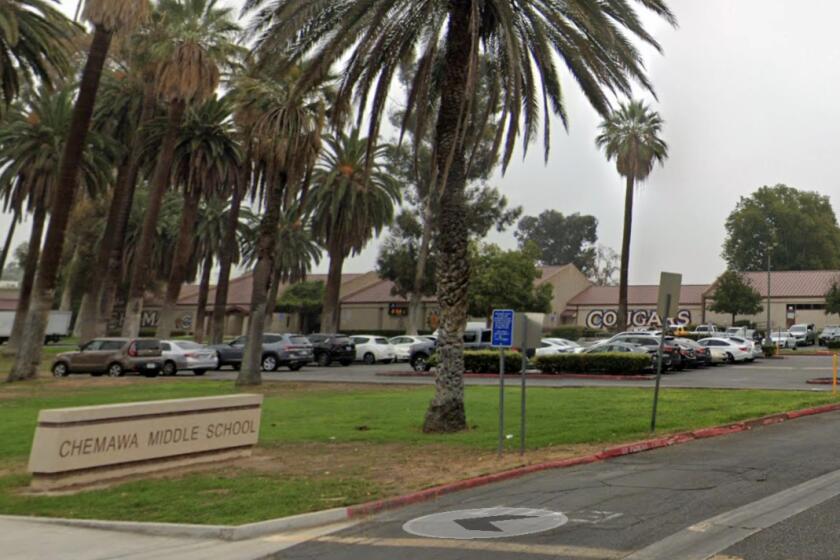UCLA Reopens Probe of Two Researchers
A UCLA medical oversight board has reopened an investigation into whether two researchers at the university took part in controversial medical studies to inject AIDS patients in China with malaria-infected blood.
A university spokesman said Tuesday that the university is examining new information suggesting that UCLA microbiology professor John L. Fahey and an associate, Najib Aziz, may have been involved with the experiments, which study the efficacy of using the high fevers induced by malaria as a possible treatment for AIDS.
The research, known as malariotherapy, is being conducted by Chinese scientists for the Cincinnati-based Heimlich Institute, founded by Dr. Henry Heimlich, creator of the anti-choking maneuver that bears his name. Proposed by Heimlich in the late 1980s, the research is viewed with skepticism by mainstream AIDS researchers.
It was not clear whether the research was ongoing. The Heimlich Institute Web site indicates that eight male patients were involved and “remained well.”
In a statement in December, UCLA said its institutional review board, which reviews medical experiments involving human subjects, had found no evidence to tie the two UCLA researchers to the malaria studies.
But last week, after inquiries by a reporter for the Cincinnati Enquirer, the university issued a second statement, saying that the review board would “continue its inquiry into anonymous accusations linking UCLA faculty to malaria studies in China.” The statement also said the university “has never approved any research pertaining to malaria therapy studies for HIV,” the virus that causes AIDS.
The Enquirer reported Sunday that it had obtained e-mails and documents dating to 1996 that tied the UCLA researchers to the China experiments.
Steven Peckman, associate director of the university’s institutional review board, would not comment Tuesday on the information that led to the reopening of the investigation.
He referred calls to UCLA spokesman Max Benavidez, who was on vacation.
Fahey and Aziz, contacted at their university offices, also declined to comment, although both have previously denied involvement in the China research.
Lawrence Lokman, UCLA’s assistant vice chancellor of university communications, said the investigation was reopened Jan. 29 but would not comment on any specifics.
The Feb. 16 Enquirer article cited an e-mail from Fahey to Heimlich dated Aug. 8, 1996, in which Fahey described the malaria experiments as “striking” and offered assistance.
“I wondered if we could ... perhaps develop a means of helping your Chinese colleagues in carrying out their studies,” Fahey wrote, according to the newspaper.
On Nov. 10, 1998, Fahey wrote to Dr. Xiao Ping Chen, who oversaw the experiments in China, according to the Enquirer. Fahey, who helped train the Chinese researcher during a three-month program at UCLA in 1997, thanked Chen for sharing his data during a follow-up visit Fahey made to China.
UCLA officials have said Chen participated in 1997 in the UCLA/Fogarty AIDS international training and research program, which provides AIDS control training to visiting scholars from developing countries. Fahey then visited Chen and five other Fogarty scholars in China in 1998, but did not participate in their research studies, the university said.
Heimlich, who credits Fahey and UCLA for its support on his institute’s Web site, was traveling and could not be reached Tuesday, an assistant said. He was quoted by the Enquirer as saying that he had no idea why the UCLA doctors would say that they were not involved with the research. Heimlich said Fahey and Aziz provided technical assistance for years, used their labs to analyze data and offered suggestions on how to proceed, the newspaper said.
Heimlich has been soliciting funds for the use of malariotherapy in treatment of AIDS, cancer and Lyme disease since the late 1980s.
His hypothesis is that high fevers induced by the disease would kill viruses, including HIV. Heimlich proposes that the malaria be caused by a blood injection and allowed to progress for about three weeks -- time to allow 10 to 12 episodes of fever -- before being cured by quinine and other drugs.
It seems unlikely that infecting an HIV-infected patient with the malaria parasite would be helpful, said Dr. Andrea Kovacs, director of the Comprehensive Maternal-Child and Adolescent HIV Management and Research Center at County-USC Medical Center.
Malarial infections suppress the body’s immunity, she said, and so would potentially worsen the immune suppression that results from the HIV virus itself.
*
Times staff writer Rosie Mestel contributed to this report.
More to Read
Sign up for Essential California
The most important California stories and recommendations in your inbox every morning.
You may occasionally receive promotional content from the Los Angeles Times.










